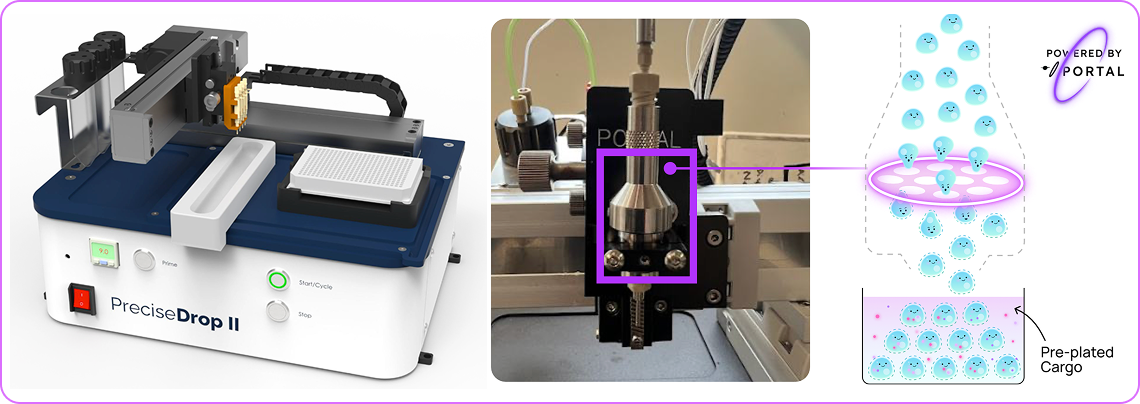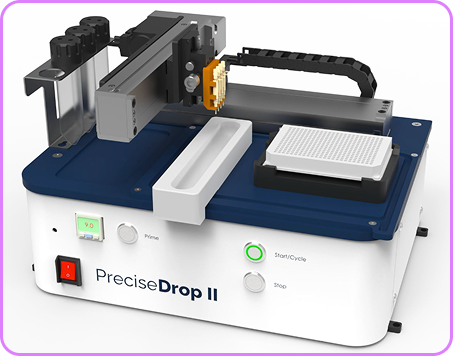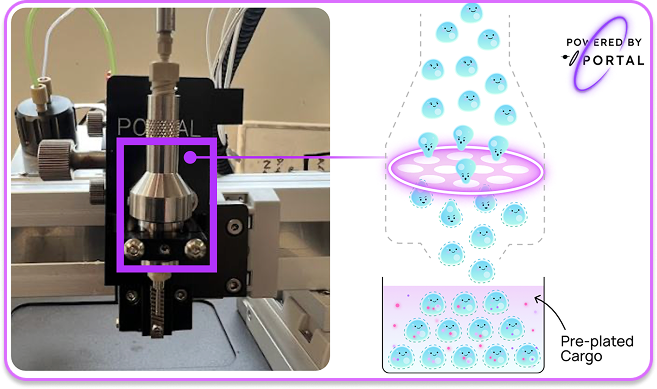Portal's Partnership with HighRes Transforms High-Throughput Drug Discovery

How our partnership with HighRes Biosolutions is enabling novel live-cell assays at unprecedented scale
The pharma industry faces a fundamental challenge: many promising drug candidates fail because early-stage screening doesn't accurately represent the complex environment inside living cells. Traditional biochemical assays, while useful, often miss critical biological interactions that only occur in the cellular context where these compounds will ultimately need to work.
At Portal Bio, we've been tackling this challenge head-on with our innovative mechanoporation technology. Now, through an exciting partnership with HighRes Biosolutions, we're bringing this capability to high-throughput screening.
The Challenge: Getting Beyond Biochemical Screens
Most early drug discovery workflows rely on biochemical and lysate-based systems that, while convenient for screening, create an artificial environment that's fundamentally different from living cells. This disconnect means researchers often miss crucial biological insights that could guide better drug development decisions early in the process.
The solution seems obvious: conduct screening directly in live cells. But there are major obstacles standing in the way. First, many of the most interesting drug candidates—including small molecules, peptides, PROTACs, DNA-encoded libraries (DELs), macrocycles, and nucleic acids—simply can't cross the cell membrane on their own. They're essentially locked out of their target environment. Second, even when compounds do reach their intracellular targets, measuring their effects presents another challenge. Traditional detection methods often require cell lysis, destroying the very biological context researchers are trying to preserve.
Our Solution: Mechanoporation That Works at Scale
Portal's mechanoporation technology offers an elegant solution to this delivery challenge. Our approach uses controlled mechanical deformation to create temporary openings in cell membranes, allowing diverse cargo types to enter the cytosol before the membrane naturally reseals. What sets our technology apart is its gentleness and scalability. Cells are "boosted" through precisely engineered pores in silicon membranes using low operating pressures that maintain cell health while enabling efficient intracellular delivery. This process works across a wide range of cell types—from established cell lines to precious primary cells—and can deliver multiple different cargos simultaneously.
Partnership with HighRes: Scaling Mechanoporation
To transform drug discovery workflows, we needed to integrate our mechanoporation technology with existing high-throughput screening infrastructure. That's where our partnership with HighRes Biosolutions comes in.
HighRes's Precise Drop II (PDII) dispenser is already a trusted tool in genomics, drug discovery, and synthetic biology workflows, known for its precision in dispensing cells and reagents from 50 nanoliters to hundreds of milliliters. By integrating Portal's mechanoporation cartridges directly into the PDII's fluidics system, we've created a seamless solution for high-throughput intracellular delivery.
The integration is remarkably simple: cargos are pre-plated in multi-well plates, and cells are mechanically boosted through our in-line cartridge immediately before dispensing. The cell membranes remain open during the brief dispense time, facilitating efficient material uptake once cells land in their wells.


Proof of Performance: The Data Speaks for Itself
We put this integrated system through testing to demonstrate its capabilities across different cargo types and cell lines. The results exceeded our expectations:
Consistent Delivery Across Plates: In experiments with HeLa cells across five 96-well plates, we demonstrated consistent delivery across all five plates. This consistent performance was demonstrated across cargos using 3kDa dextran, labeled oligo, and IgG antibody.
.png?width=1200&length=1200&name=Group%2049%20(3).png)
A) PD II In-line Integration Enables Scalable and Consistent High-Throughput delivery. HeLa cells were mechanoporated ("boosted") using either the Portal R&D system (blue) or the Portal cartridge integrated into the PDII dispenser into wells of 5, 96-well plates containing 3kDa fluorescently labeled dextran at 0.1mg/ml. Intracellular delivery to live cells was measured by flow cytometry.
.png?width=1200&length=1200&name=Group%2047%20(1).png)
.png?width=1200&length=1200&name=Group%2048%20(3).png)
Broad Cell Type Compatibility: The technology isn't limited to cell lines. We demonstrated successful delivery in HEK293 cells (>60% oligo delivery, >50% antibody delivery) and human peripheral blood mononuclear cells (PBMCs) (>70% dextran delivery). This versatility is crucial for drug discovery programs that need to validate findings across multiple cell types.
.png?width=1200&length=1200&name=Group%2050%20(1).png)
.png?width=1200&length=1200&name=Group%2051%20(2).png)
.png?width=1200&length=1200&name=Group%2052%20(2).png)
Complex Cargo Delivery: Perhaps most exciting, we showed successful delivery of GFP mRNA to HeLa cells, maintaining high cell viability (>90%) while achieving >65% transfection efficiency. This opens doors for screening applications involving gene editing tools, regulatory RNAs, and other complex biological cargos.
.png?width=1200&length=1200&name=Group%2053%20(1).png)
.png?width=1200&length=1200&name=Group%2054%20(1).png)


Applications Unlocked by HT Mechanoporation
Impermeable Peptides
Transform your drug discovery pipeline with intracellular impermeable peptide delivery that maintains native cellular context. Learn more here!
DELs
Transform your drug discovery pipeline with intracellular DEL delivery that maintains native cellular context. Our latest application note demonstrates robust delivery of fluorescently-tagged DEL libraries to iPSCs, HeLa cells, and PBMCs with no bias in compound diversity. Key benefits include higher probability that identified hits will continue to bind targets in their desired cellular context, and the ability to screen against intracellular targets in their native environment. Learn more about direct-to-biology dels.
Intracellular Protein Detection
Detect intracellular proteins in real-time in living cells. Mechanoporation delivers LgBiT directly into living cells, enabling time-resolved protein level analysis assays without lysing your cells. See the results here!
Circular RNA
Achieve 5+ days of gene expression in primary cells without genome editing. Mechanoporation delivers unmodified circular RNA for sustained protein production and enhanced CAR-T performance, no genetic modifications required. See the results
What This Means for Drug Discovery
This integration represents more than just a technical achievement, it's a paradigm shift toward more biologically relevant screening. By enabling direct-to-biology live cell assays at high-throughput scale, we're helping researchers:
- Validate targets earlier: Test compound activity directly in the cellular environment where it matters most
- Reduce late-stage failures: Identify potential issues before investing heavily in optimization
- Explore new chemical space: Screen compound classes that were previously impossible to test in cells
- Work with primary cells: Conduct more disease-relevant studies using patient-derived cells
Looking Forward: The Future of Live Cell Screening
The pharmaceutical industry is increasingly recognizing that better early-stage screening leads to better drugs reaching patients. Our partnership with HighRes Biosolutions represents a significant step toward making truly biological screening the standard rather than the exception.
As we continue to refine this technology and expand its applications, we're excited about the possibilities ahead. From screening massive compound libraries directly in disease-relevant cell models to enabling novel therapeutic modalities that require intracellular delivery, the potential impact on drug discovery is substantial.
Introduction to HighRes Biosolutions
HighRes Biosolutions specializes in precision liquid handling and automation solutions for life sciences research. Their dispensing systems are designed for efficient and reproducible cell and reagent dispensing across genomics, drug discovery, and synthetic biology workflows. HighRes instruments accurately and precisely dispense with exceptional reliability and ease of use. HighRes's instrumentation enables seamless integration into existing laboratory automation platforms, providing researchers with the precision and throughput needed for demanding applications. This robust dispensing technology serves as the ideal foundation for scaling innovative delivery approaches like mechanoporation across high-throughput screening workflows.